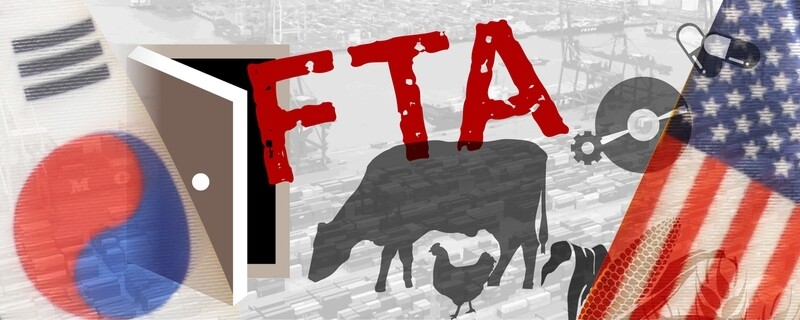hankyoreh
Links to other country sites 다른 나라 사이트 링크
[Editorial] Moon administration should be prepared to walk away from KORUS FTA

The first round of negotiations on amending the South Korea-US Free Trade Agreement (FTA) took place in Washington on Jan. 5. The two sides have now finished their preliminary procedures, including hearings and parliamentary reporting, and begun the actual talks. They are scheduled to hold the negotiations back and forth between Seoul and Washington roughly every three to four weeks.
The South Korean government needs to show its willingness to scrap the agreement outright if the US insists on unreasonable demands. While it may see like the South Korean side has been put on the defensive by US President Donald Trump’s constant threats to abandon the deal, that’s not actually the case. Many research organizations in South Korea and overseas are predicting the US stands to lose out more from the agreement being abandoned. It’s also being argued that the US’s growing trade deficit is not the result of the FTA, but its own diminished industry competitiveness.
The US has named reducing the trade deficit as its chief goal in amending the agreement. But South Korea’s trade surplus with the US has actually been on the decline since 2016. Last year, it amounted to US$17.87 billion, a 22.7% reduction from the US$22.35 billion recorded in 2016. Exports to the US have risen by just 3.2%, while imports have jumped by 17.2%. This is the result of South Korean government efforts to reduce the size of the surplus, including increases in US shale gas and liquefied natural gas (LNG) imports. South President Moon Jae-in also promised to purchase billions of dollars’ worth of weapons in a Nov. 2017 summit with US President Donald Trump. This is leverage that needs to be used to fend off the US’s attack.
The US is also demanding additional opening of the agricultural and livestock product markets. Seoul has repeatedly named agriculture as South Korea’s “red line” and insisted there would be “no further concessions” in that area. Indeed, South Korean agriculture has already suffered a serious blow since the FTA took effect in 2012. As US livestock and agriculture imports have increased, the South Korean trade deficit with the US has climbed by an average of US$750 million annually over the past five years. Increased US beef imports in particular have South Korean livestock farms facing the threat of collapse. The government must keep its promise to prevent further opening in these areas.
Seoul further needs to maintain a balance by making demands that are at the very least equal to the US’s. The government must actively push for improvements to the investor-state dispute system (ISDS), which has been named as one of the agreement’s toxic provisions, and lower standards for invoking safeguards to impose emergency import restrictions on US beef.
To repeat, South Korea has no reason whatsoever to be on the defensive. The Moon administration needs to resolutely uphold the national interest according to the principle of mutual benefit.
Please direct questions or comments to [english@hani.co.kr]

Editorial・opinion
![[Column] Has Korea, too, crossed the Rubicon on China? [Column] Has Korea, too, crossed the Rubicon on China?](https://flexible.img.hani.co.kr/flexible/normal/500/300/imgdb/original/2024/0419/9317135153409185.jpg) [Column] Has Korea, too, crossed the Rubicon on China?
[Column] Has Korea, too, crossed the Rubicon on China?![[Correspondent’s column] In Japan’s alliance with US, echoes of its past alliances with UK [Correspondent’s column] In Japan’s alliance with US, echoes of its past alliances with UK](https://flexible.img.hani.co.kr/flexible/normal/500/300/imgdb/original/2024/0419/2317135166563519.jpg) [Correspondent’s column] In Japan’s alliance with US, echoes of its past alliances with UK
[Correspondent’s column] In Japan’s alliance with US, echoes of its past alliances with UK- [Editorial] Does Yoon think the Korean public is wrong?
- [Editorial] As it bolsters its alliance with US, Japan must be accountable for past
- [Guest essay] Amending the Constitution is Yoon’s key to leaving office in public’s good graces
- [Editorial] 10 years on, lessons of Sewol tragedy must never be forgotten
- [Column] A death blow to Korea’s prosecutor politics
- [Correspondent’s column] The US and the end of Japanese pacifism
- [Guest essay] How Korea turned its trainee doctors into monsters
- [Guest essay] As someone who helped forge Seoul-Moscow ties, their status today troubles me
Most viewed articles
- 1[Column] The clock is ticking for Korea’s first lady
- 2After 2 months of delayed, denied medical care, Koreans worry worst may be yet to come
- 3Hong Se-hwa, voice for tolerance whose memoir of exile touched a chord, dies at 76
- 4Samsung barricades office as unionized workers strike for better conditions
- 5[Column] Has Korea, too, crossed the Rubicon on China?
- 6US overtakes China as Korea’s top export market, prompting trade sanction jitters
- 7[Editorial] As it bolsters its alliance with US, Japan must be accountable for past
- 8[Correspondent’s column] In Japan’s alliance with US, echoes of its past alliances with UK
- 9All eyes on Xiaomi after it pulls off EV that Apple couldn’t
- 10[Guest essay] How Korea turned its trainee doctors into monsters